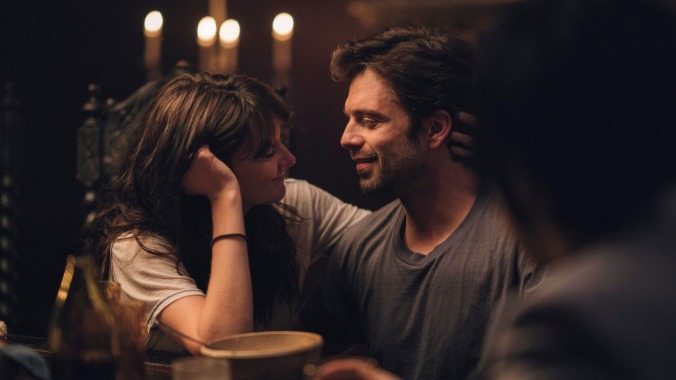Endings, Beginnings is an endless slog


Drake Doremus specializes in the indie drama equivalent of bougie engagement and wedding photos, complete with out-of-focus string lights, wet beaches, and handsomely groomed people who’ve been told to just act natural for the camera. But even by these low standards, his new film, Endings, Beginnings, is a complete dud. The plot is simple: Daphne (Shailene Woodley), a thirtyish, unemployed Los Angeleno who has recently gotten out of a relationship, vows to give up drinking and dating for six months. Then she meets two different whitebread indie-movie hunks at the same party. Jack (Jamie Dornan) is a sensitive writer; Frank (Sebastian Stan) isn’t, although he does have a certain bad-boy appeal, i.e., a vintage car. She is interested in both guys, but eventually finds out that they’re close friends. Texting ensues, playlists are shared, takeout is eaten, American Spirits are smoked, sex is had, soul-searching commences. Eventually, a pregnancy test enters the picture.
None of this is an issue on its own, as great films have been made with less dramatic stakes. The problem is that Doremus can’t direct his way out of a paper bag, and since he doesn’t like to write scripts (Endings, Beginnings was improvised from a long outline co-written with Jardine Libaire), what we’re left with is an overlong post-mumblecore soap opera that consists in large part of twinkly, shoegaze-adjacent mood-music montages and lens-flare-heavy handheld close-ups of actors pretending to go on dates. It seems distant now, but there was a time when movies like this could be successfully passed off as generational portraits just because they showed people with no personalities using cellphones.
Doremus’s only “hit,” the moderately well-received Like Crazy, came just as that moment was starting to peter out. He seems to have remained stuck there ever since, though a few recent forays into dopey sci-fi (in Equals and Zoe) did briefly introduce the concept of story into his oeuvre. To be clear, there was real novelty in the 2000s and even the early 2010s to the idea of being able to keep a camera rolling and rolling for half an hour or longer while one’s actors mingled at low-energy parties. From a cynic’s point-of-view, it was a very cheap and undemanding way to make a movie that would definitely make it into a few festivals and maybe even score distribution. But the earnest practitioners of this style did really seem to be searching for a kernel of truth or at least something that felt like their idea of real life.
Still, in many cases, it ended up producing the opposite of authenticity. An air of depressing, pointless bogusness would hang over what were basically home movies in which nobody ever did or said anything worth remembering. That’s Endings, Beginnings in a nutshell, even if it was made on a much larger budget than those half-forgotten mumblecore cheapies. Daphne, Jack, and Frank are sketches of characters at best. The film gives Daphne a family history and a vague backstory that it tries to pass off as pathology, but none of it creates the illusion of an interior life; mostly, one is left wondering where all of these people get money. The fact is that reality (the really real kind) has subtleties, which is something that the film’s pseudo-verisimilitude completely lacks. There are a lot of sex scenes (at least for a contemporary American movie), and one suspects that’s mostly because Doremus doesn’t know another way to establish that his characters have sex.
Worse are the movie’s attempts at poetic meaning, which include using an unintended pregnancy as a metaphor for personal growth and moving on from past relationships. (This, from the director whose last film was about an android who couldn’t cry but still had a vagina.) As fun as it might be to sit down and unpack the hang-ups and normative views on long-term heterosexual relations evident in Endings, Beginnings, the truth is that it’s a bad film that’s bad for the simplest reasons: It’s trite, repetitive, and boring, and it looks like a commercial, but not in a good way. Its concluding sentiment, which is spoken by Daphne in voice-over, sounds like something from an Instagrammable self-care tip: “Everything might not be okay, but that’s okay.” Somehow, it takes most of 110 minutes to reach this point.